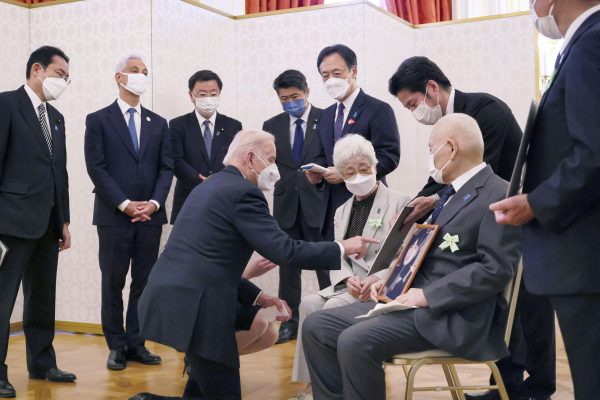On 17 September 2002, Junichiro Koizumi became the first Japanese prime minister to visit North Korea and meet with its leader, Kim Jong-il. Accompanying Koizumi was a young Shinzo Abe, who had taken an interest in the rumours about North Korean abductions of Japanese citizens in the 1970s and 1980s. While the official purpose of the visit was normalisation talks, Koizumi and Abe wanted North Korea to admit to the abductions and return the abductees.
Desperation likely led Kim to sit down at the negotiation table with the Japanese. North Korea had just experienced a severe economic crisis and famine. To many North Korea watchers, the country appeared to be on the brink of collapse. Kim hoped that the normalisation of diplomatic relations with Japan would serve as a springboard for economic recovery, eyeing Japanese compensation for colonial rule in Korea as well as economic assistance and investment.
During the negotiations, Kim eventually admitted to and apologised for the abduction of 13 Japanese citizens. However, North Korea claimed only five of the abductees were still alive. The primary motive for the abductions is alleged to be espionage or spy training in Japanese language and culture.
By admitting to the abductions, Kim wanted to demonstrate his good intentions and facilitate the potentially lucrative normalisation negotiations. Initially, it seemed like the strategy had worked. The meeting was concluded with the signing of the Pyongyang Declaration in which Japan promised ‘economic cooperation after the normalisation’.
But when Koizumi and his delegation returned to Tokyo, the news of the North Korean abductions outraged the Japanese public. The Japanese media printed a stream of stories about the horrors of Kim Jong-il’s North Korea. Under such conditions, normalisation became impossible. The Koizumi government was quick to assure a furious public that Japan would never normalise relations with North Korea without a solution to the abduction issue. But to this day, Japan and North Korea cannot agree on what constitutes a solution.
North Korea insists that the abduction issue is already resolved as Kim Jong-il made an official apology and the five survivors were eventually returned to Japan.
Japan’s official position is that as long as North Korea does not present irrefutable evidence for the death of the other abductees, they are presumed to be alive and the issue remains unresolved. Although North Korea has provided the cremated remains of some abductees, the Japanese Government insists, based on DNA tests, that the remains are not of the Japanese abductees. Japan also claims that North Korea has abducted 17, not 13, Japanese citizens.
These incompatible positions have prevented Japan and North Korea from improving, much less normalising, their relations.
Though every Japanese prime minister since Koizumi has said that a solution to the abduction issue is a top policy priority, there has been no progress on the abduction issue for the past 20 years. Even the late Shinzo Abe, who spent more political capital on the issue than anyone else, failed to deliver meaningful results. Japan’s unilateral and multilateral sanctions against Pyongyang have not worked.
This diplomatic freeze is almost certain to continue for a very long time as neither side has any incentive to make concessions to the other. An annual poll by the Japanese government shows that every year since 2002, the Japanese public has been more interested in the abduction issue than in North Korea’s nuclear weapons. This makes it almost impossible for the Japanese government to make any concessions toward North Korea without some form of solution to the abduction issue.
North Korea has good reason to be silent on the abduction issue. Kim Jong-un is old enough to remember how admitting to the abductions backfired against his father in 2002. For Kim Jong-un, the abduction issue is a political minefield best avoided. There is no incentive to make concessions toward Japan and risk reopening old wounds.
The current international context also makes bilateral engagement almost impossible. Twenty years ago, Japan and North Korea were relatively free to engage with each other on a strictly bilateral basis. But North Korea’s development of nuclear weapons has led to an international sanctions regime that Japan is obliged to uphold. The sanctions prevent virtually any economic engagement with Pyongyang.
Even in the unlikely event of a solution to the abduction issue, Japan could not ignore the sanctions regime and return to the promise of economic cooperation as stipulated in the 2002 Pyongyang Agreement. Without the hope of Japanese investment, North Korea has even less incentive to cooperate with Japan on the abduction issue.
Incompatible positions on the abduction issue and expanding international sanctions mean that the Japanese–North Korean freeze will continue with no thaw in sight.
Ulv Hanssen is Associate Professor at Soka University.

